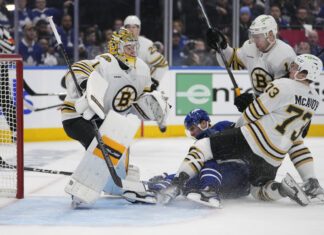Toronto Maple Leafs President Brendan Shanahan joined James Duthie of TSN to discuss the suspended season, Auston Matthews likely missing the chance to hit the 50-goal milestone this season, what he was most excited about for the 2019-20 Leafs before the pause, and his preferred scenario for the schedule/playoff format if the league returns this season.
How are you coping with what is the new normal for all of us?
Shanahan: It’s probably the way a lot of people are handling it. We try to get out maybe once a day and go for a walk or get a little bit of exercise in. I saw something about that on the Internet that I thought was humorous: It takes a quarantine before we all want to get outside and get back into shape. We’re adhering to the rules. It was a little bit difficult at the start, but my kids have been fantastic as far as staying in. They miss their friends, but they keep in touch with them on social media. We are the same way. For the most part, we have family dinners and we try to do a movie time every night. There are some good scraps. I think selecting the movie takes longer than watching the movie.
Have you won any of these arguments, or do you lose on this?
Shanahan: I think, generally speaking, it’s very wise to lose that battle. I try to convince them. My twins are 17 and my youngest is 15, so I am trying to get them to watch what I remember were the classics when I was that age — John Hughes movies, Breakfast Club, things like that. I am always trying to squeeze in one of my old favourites, but generally speaking, they are picking. And they are picking good movies, too.
More important than any of that is that we are together and are spending some time together trying to find a silver lining in what is a very difficult and scary time for adults, for kids, and for society. We are fortunate. We are a fortunate family in that sense. You think about the families or the people that don’t have some of the safe havens that we currently have. I think this has been a real eye-opener and wake-up call not just for our family but for everyone in society.
I’d also like to just take this time, before we get talking about hockey, to just thank and say how inspired I am by the frontline workers and healthcare workers and first responders and the people who are running and keeping open the essential businesses to keep our society feeling as normal as we possibly can at a time like this.
We, probably like a lot of families, have the TV on 24/7. Sometimes you just want to mute it and take a break and not listen to the news around the world, but everything is changing so quickly every day and you can’t help but watch. But I am also seeing so many inspiring stories of humanity around the world. You’d like to think that in this horrible situation, there is something learned that comes out of this afterward and maybe the world is a better place — how we treat each other and how we react to each other, and how we empathize with each other. You’d hate to think it takes something horrific like this for us to start to recognize how much we have in common in humanity.
We spend so much time idolizing hockey heroes, but with the doctors and nurses and everyone else you mentioned out there, it gives you perspective on where the real heroes are in life, correct?
Shanahan: Absolutely. I sort of hate having to say that every time something happens in the world, now it gives you perspective, but it is true. You get caught up in your daily life and your daily goals. That is just part of being human. This is something that we, in our lifetime, have never seen anything like this. I am thinking back to some of the experiences that we’ve had. I won’t even start listing them, but nothing matches, on a global scale — at least in my lifetime — what is happening here right now.
A lot of your young players, especially, are living in downtown Toronto condos. Are they going stir crazy in your communications with them?
Shanahan: Most, for that reason, have gone back to where they are from. For a lot of them, that is their offseason setup. Their places in the offseason are usually the places where they are best set up, not only to have the support from their families but also to train and stay ready. We travel so much all season, and for many of the guys, they come to Toronto and have a condo they use to sleep and to get away in between games.
What do you say to them and what questions do they have when you talk to them? They must be just like the rest of us wondering what is going on constantly.
Shanahan: We don’t have answers, either. I don’t think that anyone in the world right now can say that there a definite answer. We all just talk to them about taking precautions and give them the support they need. They communicate with each other. Imagine when this happened when we were their age. We didn’t have all of these forms of social media to connect. The players are very adept at connecting with each other when they can’t be with each other, so I think they try to support each other that way.
Kyle Dubas is sort of the point person on communicating with our players each and every day as news changes or evolves. I think that they want to remain hopeful that hockey is coming back at some point. They know that it will look different — whether we are finishing some portion of this season, or just playoffs, or whether we are just moving onto next season. They just want to be ready for whatever comes their way.
Have you tried to plan for these various scenarios? Do you have some sort of whiteboard that has six different scenarios on it? How do you deal with that as a President of a team?
Shanahan: We are doing it all remotely from our homes. The NHL just recently asked us to look at more dates for arena availability. The NBA is doing the same thing. I think everyone is just trying to keep as many options open as possible so that if there is a positive change here, eventually, we are ready to go and get started.
I talked to one of our players yesterday and he said their message to each other as players is to use this time right now for strength gains. What was normally their typical summer and typical schedule might not be their normal, typical schedule. They all want to get back and we all want to get back, but I think what they’re doing right now is the right approach — which is to just train, take care of your families and yourself, stay home, be safe, be socially responsible, and just be ready.
The NHL head office has reduced some of the wages of their staff. The Montreal Canadiens have done the same. Do you foresee the Leafs have doing to do that at a certain point here in the future?
Shanahan: It’s not something that has been talked about yet. I think we are very fortunate with the ownership that we’ve had here and the leadership that we’ve had here. Again, like all questions that come around, how this thing evolves and how long this goes none of us know. I can say that right now, that hasn’t been a subject that we’ve had to deal with.
We are all hoping we can get back together, hold the playoffs, and crown a Stanley Cup champion. There is also a worst-case scenario here where there is a second wave in the Fall and not only do we not see an end to this season, but next season is jeopardized. That is difficult for anyone to get their head around, for someone like yourself, what might the impact of this be on the game when it is said and done?
Shanahan: I think hockey won’t escape the impact this is going to have on the entire world, for sure. We have to see that as reality. We’re doing our jobs right now — which is the most important job we are all doing — and that is what is best for society and not overwhelming and inundating our health care services as best we can so that, if we are responsible, hopefully, they are always in a position to take care of the people that need to be taken care of.
I don’t think there is anything wrong with having a little bit of optimism as well. Until somebody tells me that we are not going to do something or that we can’t do something, I think our approach is always going to be planning for optimistic news and good news. That is why I am saying we want to be ready.
Leafs fans have to be missing a little bit of hockey talk. Let’s do a little bit of that. How much were you anticipating, as a guy who has scored 50 goals a couple of times, Auston Matthews hitting that mark?
Shanahan: It was exciting. He and I talked about it at one point. He really had the proper perspective, I thought. He understands this is about wins and him leading our team in that sense, but you also have to remember that is a special number. I am sure he was excited about it, as were we. That’s unfortunate, but Auston, at his age and with the upside and so much of his career still in front of him, I think he will be knocking on that door again.
He ranks fifth all-time in the percentage of games with goals. The players ahead of him are Mike Bossy, Alex Ovechkin, Mario Lemieux, and Pavel Bure, which is pretty much as elite as it gets, isn’t it?
Shanahan: Yeah, those are all good hockey players.
Is there anything that you miss most about watching this Leafs team? It was a rollercoaster season. Have you ever experienced a team with this many highs and lows, and the degree of highs and lows? This comes along to go on top of it all.
Shanahan: That’s a good question. To a certain degree, we are very focused and wrapped up, like any team, with our own performance. It seems to me to be a little bit more of the new NHL. Right when you are really focused on yourself and you are either pleased or very upset, you see another team in another city in a game they should’ve won get shellacked by a team that is well out of the playoffs. Right now, even the teams that are at the bottom of the standings have so many good players, are so well-coached, and there is so much information available that if you are not at your best and you are not ready to play, you are going to get beaten by anybody.
That wasn’t always the case in the ‘90s. There were some teams that you could take two periods off and still beat them. There were expansion teams that weren’t positioned very well. The preparation available to coaches wasn’t at the level it is now. To a certain degree, the highs and lows and unexpected wins and unexpected losses are a part of, maybe, the new NHL.
What was interesting about our team was that, as I said shortly before the break, a lot of the mistakes and a lot of the positions we put ourselves in are in some ways also attributed to the inexperience and youth of our team. What I was excited about is that, when our backs were against the wall, we came out with such strong, good performances. What I think frustrated us all, including our fans, is why did we keep putting our backs against the wall so often? That, again, is where I would point to some of the youth and inexperience.
Once you look at some of these players who have played in the NHL and had success for 10-11-12 years, there is that idea of you have to do it every night. We know you are not going to be at your best every night, but the real pros — the Sydney Crosby’s of this game — find a way of doing it on more nights than not. That is something that every young player develops and learns as a pro, and I have no doubt that our players are going to develop that as well.
With all of this adversity and all of these different proverbial smacks and punches in the nose we got this year, I was excited to see these guys get into a playoff situation — fight for a playoff situation and then get into a playoff situation — and see where things land.
Do you have a favourite scenario with all of these ones being discussed? We can assume you would like to maybe the playoffs to start so that you are guaranteed a spot right now, but are you okay with these best-of-fives? This is best-case-scenario that it can happen at this point, but do you like the idea of the playoffs starting with 16 teams or 20 teams? Is there anything in particular that you like among these ideas?
Shanahan: I’ll be honest — I just want hockey back. I also want hockey back when it is the safe time and right time to do it. It is not going to be entirely within the control of the NHL or any of the other sports leagues as to when we come back. There will be other, bigger entities helping us make those decisions as well, but again, to speculate on what this could look like or when it starts is a little bit fruitless. It really just depends on where we are and when we can.
Any form of hockey at that point will be welcomed — not just from hockey fans, but I think, especially when you look at Canada, we put so much of our national identity into the sport of hockey and not just at the professional level. When the time comes that players start coming back to arenas and they start getting on the ice and training and working out together, that is going to do so much in some ways for our national psyche. It is not just to point things at hockey — there are so many more important things than hockey — but I work in hockey, so that is my focus: When we come back, how important that will be.

































